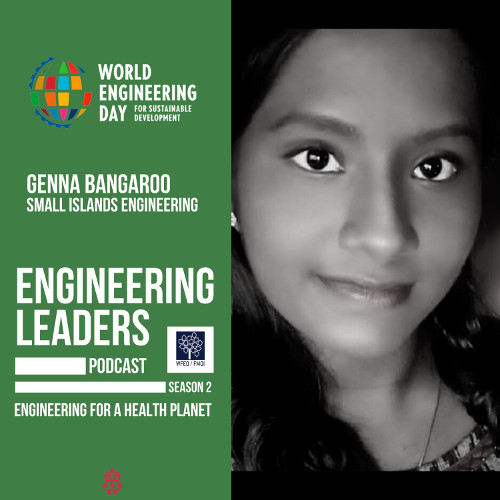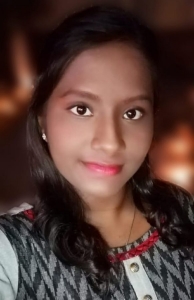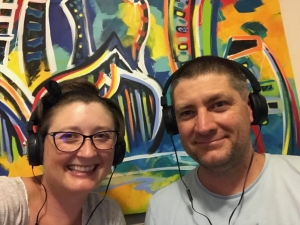See all the episodes of the Engineering Leaders Podcasts
 Genna Bangaroo spoke to Engineering Leaders from her home island of Mauritius, a small island that is being especially impacted by climate change. The issues that are being experienced require the intelligence and skills of engineers to assist in maintaining healthy living conditions. And COVID19 has particularly shown that Mauritius must not rely so heavily on the help from external, but be able to build the skills within their own population.
Genna Bangaroo spoke to Engineering Leaders from her home island of Mauritius, a small island that is being especially impacted by climate change. The issues that are being experienced require the intelligence and skills of engineers to assist in maintaining healthy living conditions. And COVID19 has particularly shown that Mauritius must not rely so heavily on the help from external, but be able to build the skills within their own population.
About Genna Bangaroo
 Genna Rajam Bangaroo was born in Rose-Hill, Mauritius. She is 23 years old and is currently studying civil engineering full time at the University of Mauritius.
Genna Rajam Bangaroo was born in Rose-Hill, Mauritius. She is 23 years old and is currently studying civil engineering full time at the University of Mauritius.
Genna’s life motto: Live your life having an artist’s ambition with an engineer’s mindset.
About Ramaley Media
 Melanie & Dominic De Gioia, from Ramaley Media, are also the hosts of the podcast Engineering Leaders.
Melanie & Dominic De Gioia, from Ramaley Media, are also the hosts of the podcast Engineering Leaders.
Dominic is a mechanical engineer and the Director of a multi-disciplinary engineering firm in Sydney, Australia.
Melanie is the Director of Ramaley Media, a specialised media company promoting STEM. She is the Producer of Engineers Australia’s podcast, Engineering Leaders and is the project manager at The Warren Centre for Advanced Engineering, within the University of Sydney.
Transcript
This is a “close” copy of the words that were spoken during Ming-Ming’s interview
It is not 100% accurate.
Welcome to the WFEO’s podcast, Engineering Leaders. This is season 2, especially made to promote World Engineering Day, engineering for a healthy planet.
Your hosts are Melanie & Dominic De Gioia.
Dom: Our guest this episode has a very unique perspective on life. She has grown up on a very small island of a little over 1.3 million people. An island called Mauritius.
Mel: And as coming from a small island, the challenges she has experienced revolve around water and the need for climate action. She spoke to us about the shift in society from being water abundant to water stressed and how this has had many flow on effects, such as with tourism and the economy.
Dom: Our guest today is Genna Baragaroo…
She was born in Rose-Hill, Mauritius. Genna is 23 years old and currently studying civil engineering full time at the University of Mauritius.
She has the life motto: Live your life having an artist’s ambition with an engineer’
Mel: As a little girl Genna was always interested in engineering icons such as the pyramids and other engineering marvels.
She was always asking why things worked the way they did.
Her favourite subjects were design and technology, so she just naturally fell into engineering.
But she didn’t grow up with engineers or knowing engineers.
She described to us a pivotal moment came about when she was reading a news article….
(00:00:00) Genna: It was about the launching of the software known as IC Flood which allows the general public to timely report flooding conditions. This captured my interest in civil engineering. A discipline, which aims at upgrading our living conditions and providing a safe environment for people. For me, I personally believe that engineers are the problem solvers of our society who thrive on challenges.
(00:00:32) And also the other one behind the scenes beautifully designing models for the welfare of humanity. So as I aspire to contribute to the future development of my country, I am looking forward to focusing on water engineering at the university.
(00:00:54) Mel or Dom: So you’re from Mauritious and that is a small Island in the Indian ocean. Although I think you said there was over a million people there. So, uh, that’s a lot of people on a small Island. What do you see are the key issues specifically for engineers to deliver a healthy planet in that area?
(00:01:12) Genna: For small Island, developing States, civilians more likely to storms and floods, storm surges and coastal erosion. We have impacts on the socioeconomic wellbeing of island communities. Beach erosion, and currently chain in small Island, developing States, like Mauritius, are likely to reduce tourism.
(00:01:36) For instance, water very much taken for granted is fast becoming important problem, already Mauritius has shifted from being water abundant to water stress. So there is also strong evidence that water resources in small islands are likely to be seriously compromised. Also, there are unstable rainfall patterns and floods, which are affecting Mauritius, leading to human losses and serious damage to infrastructure.
(00:02:08) The impacts of climate change on Mauritius in terms of environmental degradation are extreme rainfall, raising the risk of fled, hence increases in the frequency and severity of floods and droughts will have implications on sustainable development.
(00:02:30) Mel or Dom: Have you actually personally experienced a flood or a sea surge or anything like that?
(00:02:38) Genna: Yes. Floods in front of my house, usually it into my yard. It’s
(00:02:45) Mel or Dom: Oh, wow.
(00:02:46) Genna: yeah, it damages.
(00:02:48) Mel or Dom: Is that a common occurrence.
(00:02:50) Genna: Yes. Especially during the period of March, it’s the rainy season. And so we will have many extreme rate force.
(00:02:58) Mel or Dom: Is that something that’s always been like that? Or is it something that’s getting worse?
(00:03:03) Genna: it’s getting worse with climate change because we are having more extreme in force intensity. And so like we need to innovate in terms of policies and in terms of their solution. Solution must be community-based and we have to innovate in terms of, not just constructing trains, but also we need to implement innovative policies.
(00:03:31) Mel or Dom: So what do you see as some of the priorities for engineers to abate these climate conditions?
(00:03:37) Genna: Small Island, developing States should aim the Sustainable Development Goals, which are the blueprint to achieve a better and more sustainable future for all, so that they can address the global challenges that we face. The climate change, environmental degradation, poverty, and equality.
(00:04:00) COVID-19 was in fact, an opportunity for small Island developing States to show the world that we are totally unprepared for natural catastrophe or pandemic. For instance, for Mauritius, we need to tap into the potential of our own local skilled professionals in order to find solution to address critical issues in the country, instead of always relying on foreign Conservancy services.
(00:04:28) As the saying goes. If we fail to plan, we plan to fail. So Mauritius needs to implement a preparedness plan against such human and natural catastrophes. If you have water being a precious commodity factor to life, no effort should be spent to ensure it continues an adequate supply of water to the immersion nation.
(00:04:53) I also think that the water, food, energy nexus is central to sustainable development. Demand for all three sectors is increasing, driven by several factors, namely rapid urbanization and over-consumption. So this ensures makers in Mauritius must strive for innovative policies and integrated institutions to address climate change.
(00:05:19) Mel or Dom: Well, okay. So what. Was just, there is not only are there the policy makers that need to strive for these change and care. But what you were saying is COVID-19 actually put a spotlight on that you need to, or Mauritius needs to, focus in on helping itself, as opposed to relying on external. So do you see that there is a push for people into engineering in your area to actually help manage all these situations.
(00:05:54) Genna: yes. With the emergence of COVID-19 the Mauritius professionals in the engineering or construction sector have been organizing webinars to raise awareness on climate change adaptation and sustainable development. These webinars and seminars have been empowering Mauritian citizens by developing their critical thinking and creativity.
(00:06:18) In this way, all stakeholders have a platform to inform Mauritian citizens about the impacts of climate change and sustainable development. In Mauritius we also have our local practices in line with sustainable development for example, in order to achieve sustainable development goals related to water Mauritius has and integrate them to what their resources management, then 2017 to 2022, which helps to ensure the availability of water to all sectors of the economy and to promote water efficiency at all levels. For instance, at university level, the university of Mauritius students have addressed the issue of water-wise campus, poor water conservation through awareness campaigns on water sustainability
(00:07:12) Mel or Dom: So Genna, what sort of things are you doing specifically to help with the issues in Mauritius?
(00:07:18) Genna: Well, since I am it’s civil engineering students, I don’t have any power to make things change, but for now I can only gain all the knowledge that I can so that I get my degree. And then when I become an engineer, I can implement all this knowledge that I gained at university. So that I can bring more solutions to help resolve all of this problem in my country.
(00:07:46) Mel or Dom: Well, it sounds like even during your university degree, the fact that there are those initiatives that are going on at university shows that you can do something, it really is up to all of us to make the change. it’s amazing the difference that each of us can make to the whole picture.
(00:08:06) Genna: yes, just like this podcast. So I am able to showcase my abilities and critical thinking and also showcase my communication skills.
(00:08:16) Mel or Dom: So we’re coming up to World Engineering Day on the 4th of March and we just wanted to ask, what does World Engineering Day mean to you?
(00:08:23) Genna: Engineers do not work for applause, they work for a cause. it is also a way of highlighting the contribution of all engineers, great inventors, and everyone in the engineering profession on this day. Also, I wish to add that we should now focus more on gender neutrality in the engineering sector and encourage engineers to be multidisciplinary for engineering in better future.
(00:08:51) Mel or Dom: Are you doing anything special for world engineering day?
(00:08:55) Genna: Yes, I will be speaking in for the UNESCO event.
(00:08:59) Mel or Dom: Oh, wonderful. We want to thank you so much for joining us today. It was great speaking with you. Thank you so much.
(00:09:05) Genna: Thank you so much. On this note I’d like to find the faculty of engineering, of the university of Mauritius, the president of the institution of engineers, Mr. Chapeau, and Dr. Marlene Kanga for giving me this opportunity. Lastly, I wish all engineers and people in the engineering profession around the world, a very happy World Engineering Day. Give engineering our sustainable future.
(00:09:32) Mel or Dom: Oh, thank you. Thank you so much.
